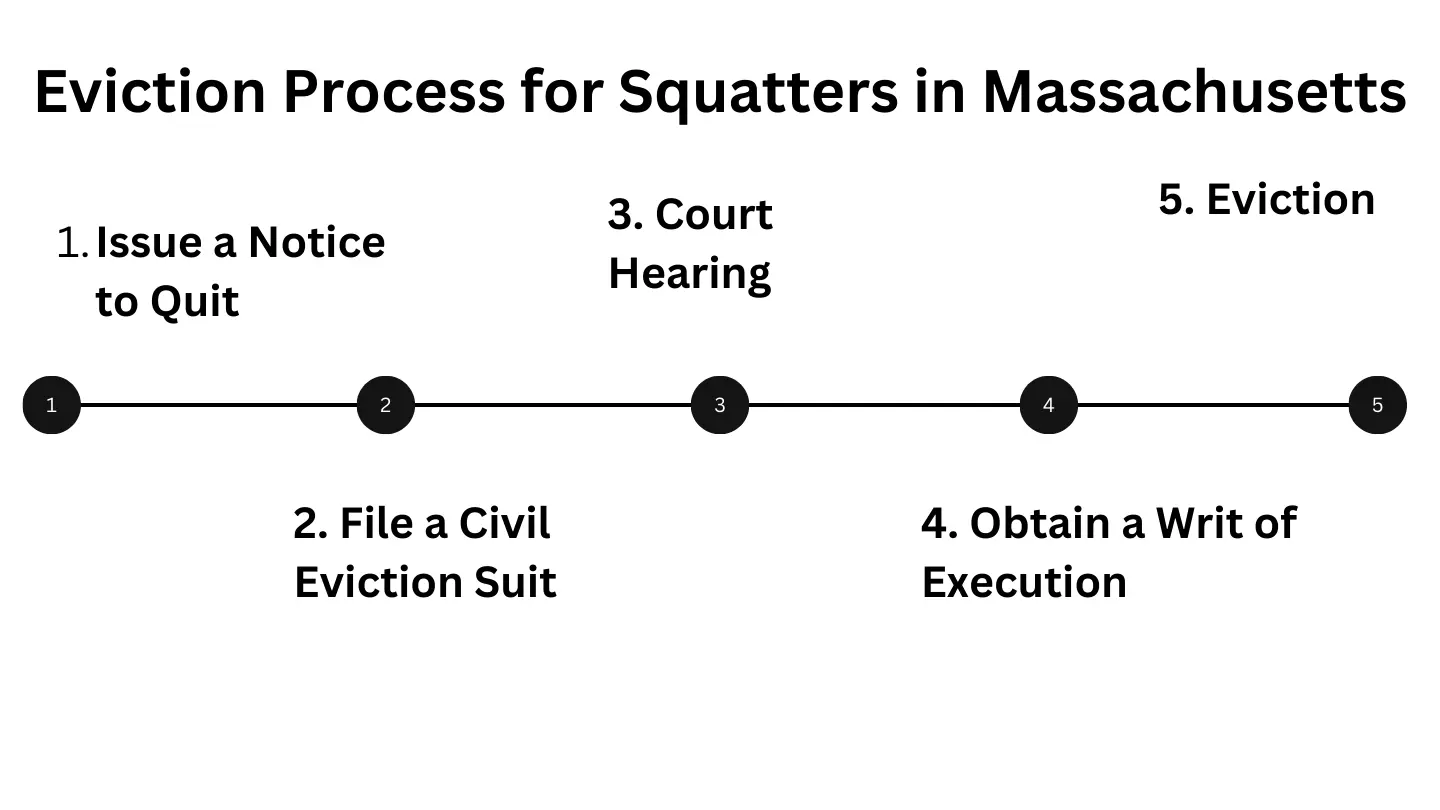Overview
Squatters in Massachusetts can pose significant challenges for property owners. This guide covers everything landlords need to know— from the basics of squatter's rights and adverse possession requirements to legal eviction procedures and proactive prevention strategies.
In this guide, we’ll cover:
- What Massachusetts squatter’s rights entail
- The legal framework behind adverse possession in Massachusetts
- How to legally remove squatters from your property
- Preventive measures to safeguard your property
With this knowledge, property owners can take proactive steps to avoid legal disputes and protect their investments.
Understanding Squatter's Rights in Massachusetts
In Massachusetts, squatting is defined as the occupation of a property without the permission of its owner. Although initially a civil matter, unauthorized occupancy can sometimes progress to an adverse possession claim if specific legal conditions are met.
Common scenarios include:
- Occupations of abandoned or foreclosed properties
- Disputes arising from unclear property boundaries
- Emergencies where squatters initially seek temporary shelter that extends into long-term occupancy
Once a squatter establishes continuous residency, they may be able to claim legal rights under Massachusetts adverse possession laws. Property owners must remain vigilant and address unauthorized occupancy promptly. For detailed legal standards, refer to the Massachusetts Legislature.
Adverse Possession in Massachusetts
Adverse possession is the legal mechanism by which a squatter may eventually claim ownership of property. In Massachusetts, several strict criteria must be met:
- Hostility: The squatter occupies the property without permission or any express consent from the owner.
- Actual Possession: The squatter uses and maintains the property much like an owner would.
- Open and Notorious Occupation: The residency must be obvious to neighbors and the rightful owner.
- Exclusive and Continuous Possession: The squatter must maintain exclusive and uninterrupted occupancy for at least 20 years.
These requirements are set forth in the Massachusetts General Laws (e.g., Chapter 260, Section 21). Even if these conditions are met, winning an adverse possession claim is challenging, requiring clear evidence of continuous, exclusive, and overt occupancy. Local Land Courts can be involved when title disputes arise. For more details, consult a legal expert or visit the Massachusetts government website.
Eviction Process for Squatters
When squatters occupy a property, Massachusetts law requires that property owners follow a strict legal process to regain control. The key steps are:

- Issue a Notice to Quit: Formally notify the squatter that they must vacate the premises within a specified time frame.
- File a Civil Eviction Suit: If the notice is ignored, initiate legal proceedings in court by filing an eviction lawsuit.
- Court Hearing: Present your evidence (including proof of ownership and documented unauthorized occupancy) to a judge.
- Obtain a Writ of Execution: Once the court rules in your favor, a sheriff or constable will execute the eviction order.
It is important to follow these steps and never attempt a “self-help eviction,” which is illegal and can lead to additional legal liabilities. More information can be found at the Massachusetts Courts website.
Tips to Prevent Squatters
Proactive measures are key to protecting your property from unauthorized occupancy. Consider these strategies for Massachusetts properties:
- Maintain Current Property Taxes: Timely payment of taxes reinforces clear ownership records.
- Enhance Security Measures: Install robust locks, security cameras, and alarm systems to deter intruders.
- Conduct Regular Inspections: Periodically inspect vacant or underutilized properties to catch early signs of squatting.
- Post "No Trespassing" Signs: Clearly mark your property boundaries to discourage unauthorized entry.
- Engage Professional Management: Consider hiring property management services that offer regular oversight and swift action against potential squatters.
These practices not only reduce the likelihood of squatters establishing residence but also provide valuable documentation should an adverse possession claim arise. For verification of property records in Massachusetts, check resources on the Massachusetts Land Records system.
Frequently Asked Questions
Final Thoughts
Understanding squatter's rights and adverse possession laws in Massachusetts is essential for protecting your property investments. By familiarizing yourself with the legal framework and following strict eviction procedures while implementing proactive prevention measures, you can minimize the risk of unauthorized occupancy and avoid costly disputes.
At Simpli Management, we equip landlords with powerful tools—like our Property Valuation Software—to manage properties efficiently and stay ahead of potential challenges. Explore our property management solutions today to safeguard your assets.

